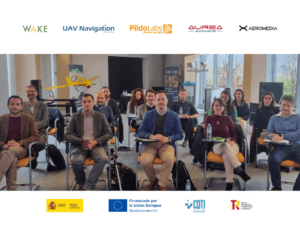
by DRONELIFE Staff Writer Ian M. Crosby
The presence of open category operations restricts the current use of unmanned vehicles to a narrow scope of applications, limiting their ability to be deployed in other beneficial use cases with great value and high operational complexity.
In response to this issue, the U-SCUAR consortium was formed to conduct advanced research in the field of unmanned systems. The goal of the project is to enable the safe use of unmanned vehicles in advanced operations such as firefighting, maritime rescue, and coastal surveillance. The consortium seeks to develop a comprehensive system capable of operation in medium-risk SAIL III and IV operational scenarios in line with the SORA methodology and in compliance with the requirements of the European regulations on UAS.
In recognition of its strong strategic, technological, and innovative nature, the U-SCUAR project was made a part of the Aeronautical Technology Program (PTA) of the Spanish Ministry of Science and Innovation. This program is framed within the Strategic Project for Aerospace Economic Recovery and Transformation (PERTE), approved this past March by the Interministerial Commission. PERTE intends to mobilize roughly 4,533 million euros in the time between 2021 and 2025 in order to reinforce the aviation industry, with U-SCUAR having made major contributions to unmanned aerial vehicle technologies.
The consortium of companies working on the U-SCUAR project will be led by Wake Engineering, with strategic partners including UAV Navigation, Pildo Consulting, Aurea Avionics and Aeromedia UAV. The consortium will also collaborate with Research Organizations such as AICIA, UPM or CATEC. The project has been subsidized by the CDTI, co-financed with European funds from the Recovery and Resilience Mechanism and supported by the Ministry of Science and Innovation.
The U-SCUAR consortium’s efforts will enable a greater number of potential applications for the use of UAS of specific categories, allowing them to participate in missions of great societal benefit.
Read more:
- Europe’s U-Space Framework: Amit Ganjoo on The Drone Radio Show Podcast with Randy Goers
- AgEagle on European Drone Regulations: Challenges, Benefits and Opportunities (From the Floor of INTERGEO)
- Percepto BVLOS Waiver First Under New European Drone Regulations
- European Drone Regulations: EASA Basic Regulation, and What’s Next
Ian attended Dominican University of California, where he received a BA in English in 2019. With a lifelong passion for writing and storytelling and a keen interest in technology, he is now contributing to DroneLife as a staff writer.

Miriam McNabb is the Editor-in-Chief of DRONELIFE and CEO of JobForDrones, a professional drone services marketplace, and a fascinated observer of the emerging drone industry and the regulatory environment for drones. Miriam has penned over 3,000 articles focused on the commercial drone space and is an international speaker and recognized figure in the industry. Miriam has a degree from the University of Chicago and over 20 years of experience in high tech sales and marketing for new technologies.
For drone industry consulting or writing, Email Miriam.
TWITTER:@spaldingbarker
Subscribe to DroneLife here.